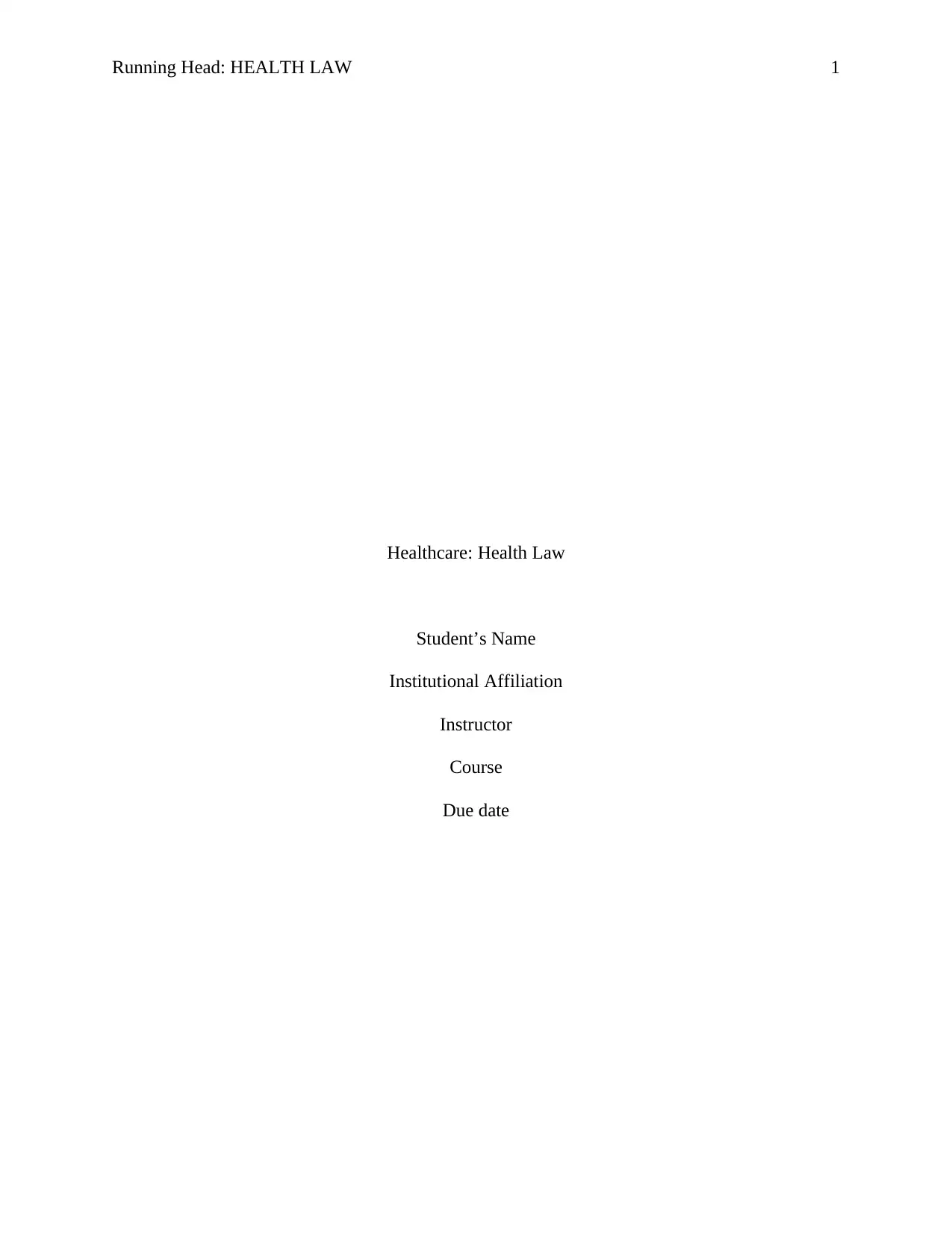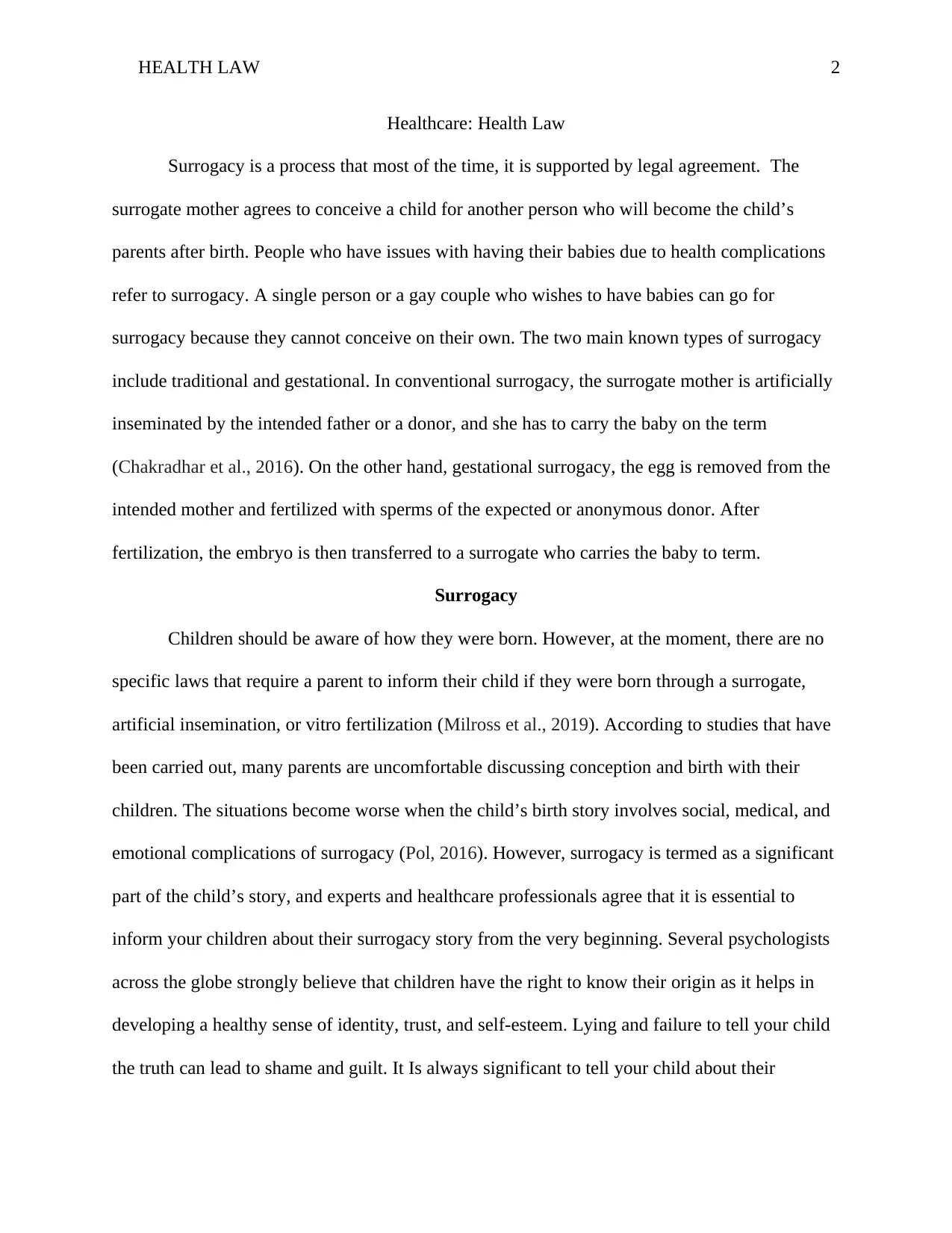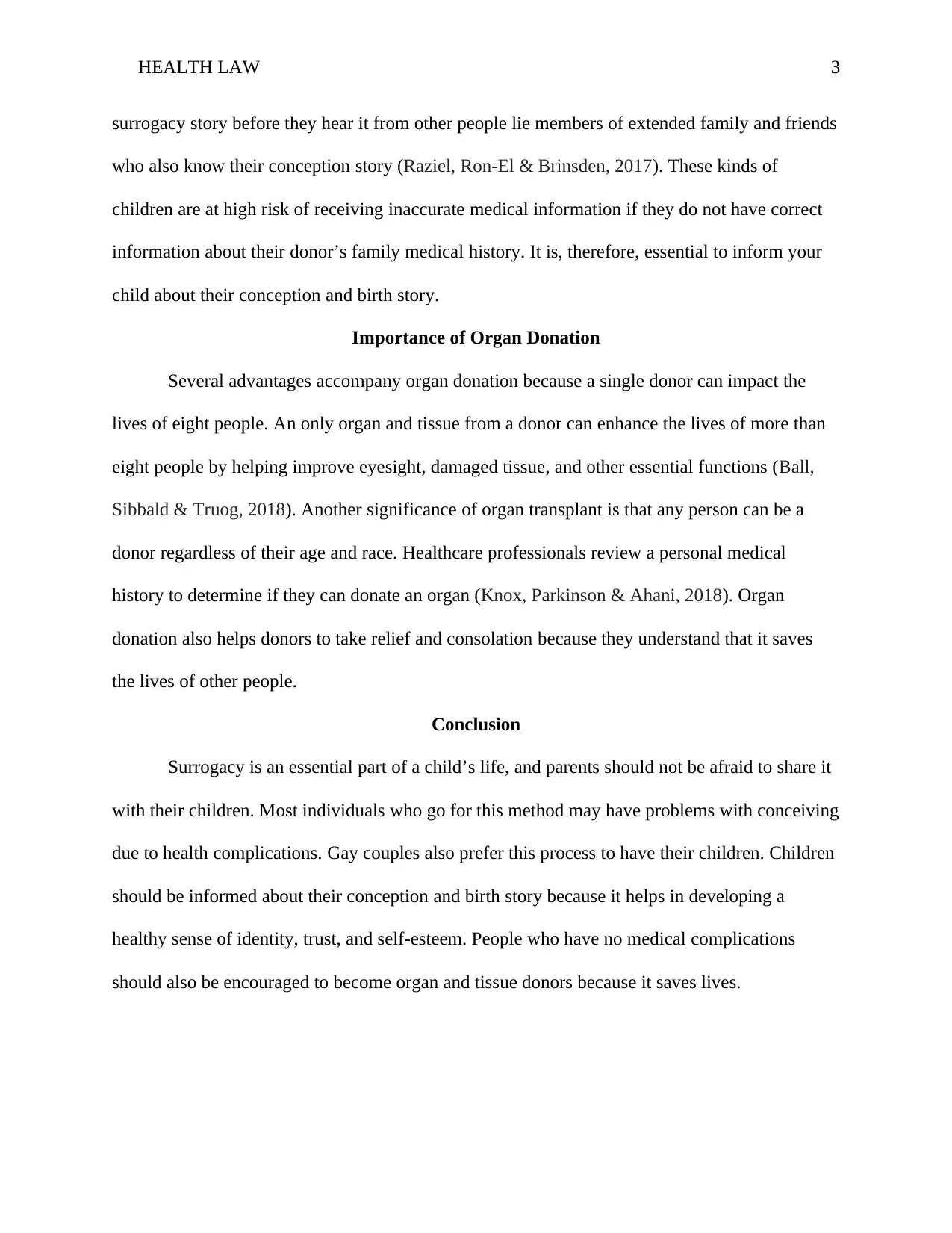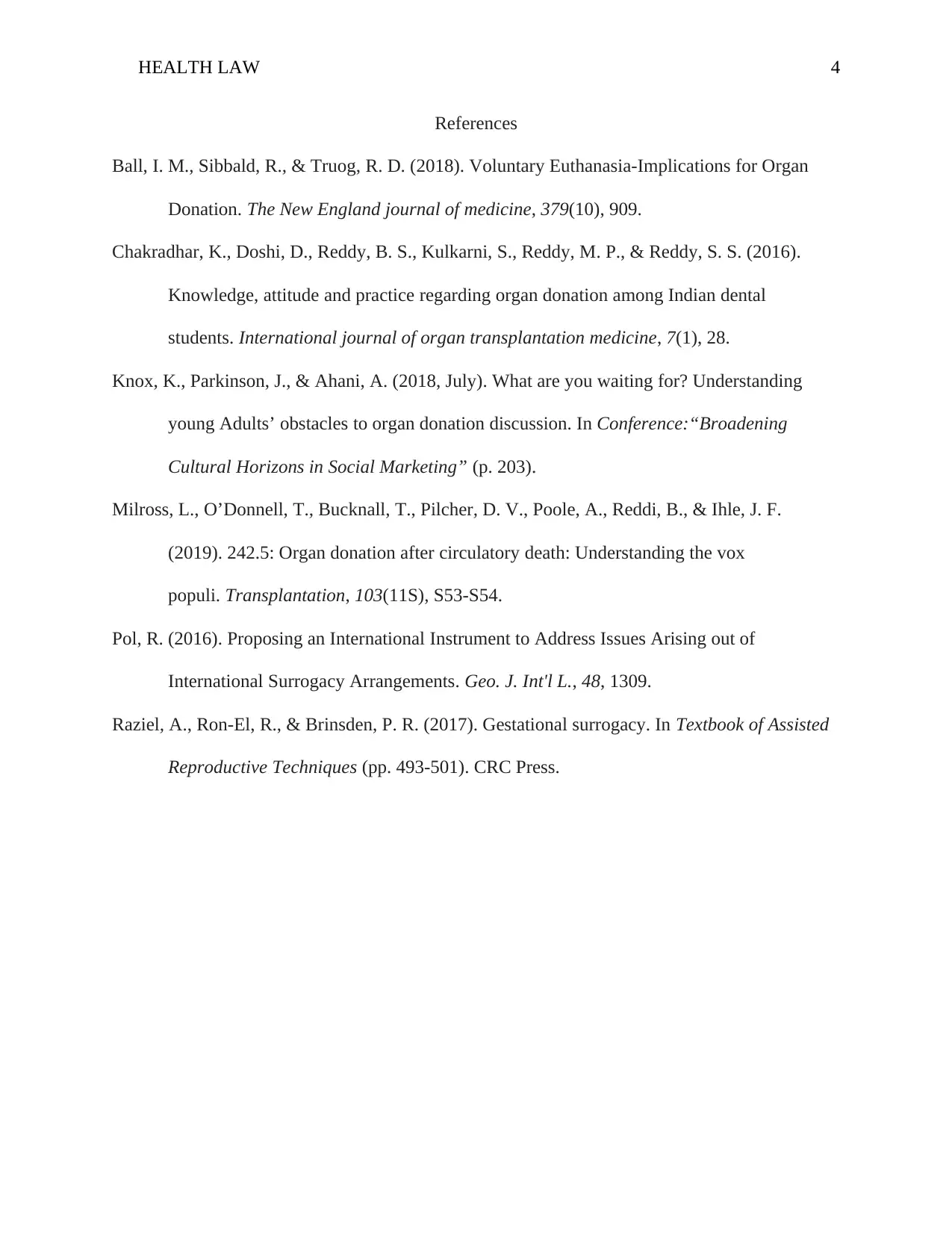Health Law 2 Assignment: Surrogacy, Organ Donation, and Child's Rights
VerifiedAdded on 2022/09/23
|4
|977
|22
Essay
AI Summary
This health law essay delves into the complexities of surrogacy, differentiating between traditional and gestational methods and highlighting the legal agreements typically involved. It emphasizes the importance of informing children born through surrogacy about their origins, citing psychological benefits such as fostering a healthy sense of identity and trust, and the potential risks of withholding information. The essay also underscores the significance of organ donation, detailing its impact on multiple lives and the criteria for becoming a donor, while acknowledging the emotional and ethical considerations surrounding the process. The conclusion reinforces the need for open communication about surrogacy and encourages organ donation to save lives.

Running Head: HEALTH LAW 1
Healthcare: Health Law
Student’s Name
Institutional Affiliation
Instructor
Course
Due date
Healthcare: Health Law
Student’s Name
Institutional Affiliation
Instructor
Course
Due date
Paraphrase This Document
Need a fresh take? Get an instant paraphrase of this document with our AI Paraphraser

HEALTH LAW 2
Healthcare: Health Law
Surrogacy is a process that most of the time, it is supported by legal agreement. The
surrogate mother agrees to conceive a child for another person who will become the child’s
parents after birth. People who have issues with having their babies due to health complications
refer to surrogacy. A single person or a gay couple who wishes to have babies can go for
surrogacy because they cannot conceive on their own. The two main known types of surrogacy
include traditional and gestational. In conventional surrogacy, the surrogate mother is artificially
inseminated by the intended father or a donor, and she has to carry the baby on the term
(Chakradhar et al., 2016). On the other hand, gestational surrogacy, the egg is removed from the
intended mother and fertilized with sperms of the expected or anonymous donor. After
fertilization, the embryo is then transferred to a surrogate who carries the baby to term.
Surrogacy
Children should be aware of how they were born. However, at the moment, there are no
specific laws that require a parent to inform their child if they were born through a surrogate,
artificial insemination, or vitro fertilization (Milross et al., 2019). According to studies that have
been carried out, many parents are uncomfortable discussing conception and birth with their
children. The situations become worse when the child’s birth story involves social, medical, and
emotional complications of surrogacy (Pol, 2016). However, surrogacy is termed as a significant
part of the child’s story, and experts and healthcare professionals agree that it is essential to
inform your children about their surrogacy story from the very beginning. Several psychologists
across the globe strongly believe that children have the right to know their origin as it helps in
developing a healthy sense of identity, trust, and self-esteem. Lying and failure to tell your child
the truth can lead to shame and guilt. It Is always significant to tell your child about their
Healthcare: Health Law
Surrogacy is a process that most of the time, it is supported by legal agreement. The
surrogate mother agrees to conceive a child for another person who will become the child’s
parents after birth. People who have issues with having their babies due to health complications
refer to surrogacy. A single person or a gay couple who wishes to have babies can go for
surrogacy because they cannot conceive on their own. The two main known types of surrogacy
include traditional and gestational. In conventional surrogacy, the surrogate mother is artificially
inseminated by the intended father or a donor, and she has to carry the baby on the term
(Chakradhar et al., 2016). On the other hand, gestational surrogacy, the egg is removed from the
intended mother and fertilized with sperms of the expected or anonymous donor. After
fertilization, the embryo is then transferred to a surrogate who carries the baby to term.
Surrogacy
Children should be aware of how they were born. However, at the moment, there are no
specific laws that require a parent to inform their child if they were born through a surrogate,
artificial insemination, or vitro fertilization (Milross et al., 2019). According to studies that have
been carried out, many parents are uncomfortable discussing conception and birth with their
children. The situations become worse when the child’s birth story involves social, medical, and
emotional complications of surrogacy (Pol, 2016). However, surrogacy is termed as a significant
part of the child’s story, and experts and healthcare professionals agree that it is essential to
inform your children about their surrogacy story from the very beginning. Several psychologists
across the globe strongly believe that children have the right to know their origin as it helps in
developing a healthy sense of identity, trust, and self-esteem. Lying and failure to tell your child
the truth can lead to shame and guilt. It Is always significant to tell your child about their

HEALTH LAW 3
surrogacy story before they hear it from other people lie members of extended family and friends
who also know their conception story (Raziel, Ron-El & Brinsden, 2017). These kinds of
children are at high risk of receiving inaccurate medical information if they do not have correct
information about their donor’s family medical history. It is, therefore, essential to inform your
child about their conception and birth story.
Importance of Organ Donation
Several advantages accompany organ donation because a single donor can impact the
lives of eight people. An only organ and tissue from a donor can enhance the lives of more than
eight people by helping improve eyesight, damaged tissue, and other essential functions (Ball,
Sibbald & Truog, 2018). Another significance of organ transplant is that any person can be a
donor regardless of their age and race. Healthcare professionals review a personal medical
history to determine if they can donate an organ (Knox, Parkinson & Ahani, 2018). Organ
donation also helps donors to take relief and consolation because they understand that it saves
the lives of other people.
Conclusion
Surrogacy is an essential part of a child’s life, and parents should not be afraid to share it
with their children. Most individuals who go for this method may have problems with conceiving
due to health complications. Gay couples also prefer this process to have their children. Children
should be informed about their conception and birth story because it helps in developing a
healthy sense of identity, trust, and self-esteem. People who have no medical complications
should also be encouraged to become organ and tissue donors because it saves lives.
surrogacy story before they hear it from other people lie members of extended family and friends
who also know their conception story (Raziel, Ron-El & Brinsden, 2017). These kinds of
children are at high risk of receiving inaccurate medical information if they do not have correct
information about their donor’s family medical history. It is, therefore, essential to inform your
child about their conception and birth story.
Importance of Organ Donation
Several advantages accompany organ donation because a single donor can impact the
lives of eight people. An only organ and tissue from a donor can enhance the lives of more than
eight people by helping improve eyesight, damaged tissue, and other essential functions (Ball,
Sibbald & Truog, 2018). Another significance of organ transplant is that any person can be a
donor regardless of their age and race. Healthcare professionals review a personal medical
history to determine if they can donate an organ (Knox, Parkinson & Ahani, 2018). Organ
donation also helps donors to take relief and consolation because they understand that it saves
the lives of other people.
Conclusion
Surrogacy is an essential part of a child’s life, and parents should not be afraid to share it
with their children. Most individuals who go for this method may have problems with conceiving
due to health complications. Gay couples also prefer this process to have their children. Children
should be informed about their conception and birth story because it helps in developing a
healthy sense of identity, trust, and self-esteem. People who have no medical complications
should also be encouraged to become organ and tissue donors because it saves lives.
⊘ This is a preview!⊘
Do you want full access?
Subscribe today to unlock all pages.

Trusted by 1+ million students worldwide

HEALTH LAW 4
References
Ball, I. M., Sibbald, R., & Truog, R. D. (2018). Voluntary Euthanasia-Implications for Organ
Donation. The New England journal of medicine, 379(10), 909.
Chakradhar, K., Doshi, D., Reddy, B. S., Kulkarni, S., Reddy, M. P., & Reddy, S. S. (2016).
Knowledge, attitude and practice regarding organ donation among Indian dental
students. International journal of organ transplantation medicine, 7(1), 28.
Knox, K., Parkinson, J., & Ahani, A. (2018, July). What are you waiting for? Understanding
young Adults’ obstacles to organ donation discussion. In Conference:“Broadening
Cultural Horizons in Social Marketing” (p. 203).
Milross, L., O’Donnell, T., Bucknall, T., Pilcher, D. V., Poole, A., Reddi, B., & Ihle, J. F.
(2019). 242.5: Organ donation after circulatory death: Understanding the vox
populi. Transplantation, 103(11S), S53-S54.
Pol, R. (2016). Proposing an International Instrument to Address Issues Arising out of
International Surrogacy Arrangements. Geo. J. Int'l L., 48, 1309.
Raziel, A., Ron-El, R., & Brinsden, P. R. (2017). Gestational surrogacy. In Textbook of Assisted
Reproductive Techniques (pp. 493-501). CRC Press.
References
Ball, I. M., Sibbald, R., & Truog, R. D. (2018). Voluntary Euthanasia-Implications for Organ
Donation. The New England journal of medicine, 379(10), 909.
Chakradhar, K., Doshi, D., Reddy, B. S., Kulkarni, S., Reddy, M. P., & Reddy, S. S. (2016).
Knowledge, attitude and practice regarding organ donation among Indian dental
students. International journal of organ transplantation medicine, 7(1), 28.
Knox, K., Parkinson, J., & Ahani, A. (2018, July). What are you waiting for? Understanding
young Adults’ obstacles to organ donation discussion. In Conference:“Broadening
Cultural Horizons in Social Marketing” (p. 203).
Milross, L., O’Donnell, T., Bucknall, T., Pilcher, D. V., Poole, A., Reddi, B., & Ihle, J. F.
(2019). 242.5: Organ donation after circulatory death: Understanding the vox
populi. Transplantation, 103(11S), S53-S54.
Pol, R. (2016). Proposing an International Instrument to Address Issues Arising out of
International Surrogacy Arrangements. Geo. J. Int'l L., 48, 1309.
Raziel, A., Ron-El, R., & Brinsden, P. R. (2017). Gestational surrogacy. In Textbook of Assisted
Reproductive Techniques (pp. 493-501). CRC Press.
1 out of 4
Related Documents
Your All-in-One AI-Powered Toolkit for Academic Success.
+13062052269
info@desklib.com
Available 24*7 on WhatsApp / Email
![[object Object]](/_next/static/media/star-bottom.7253800d.svg)
Unlock your academic potential
Copyright © 2020–2026 A2Z Services. All Rights Reserved. Developed and managed by ZUCOL.





